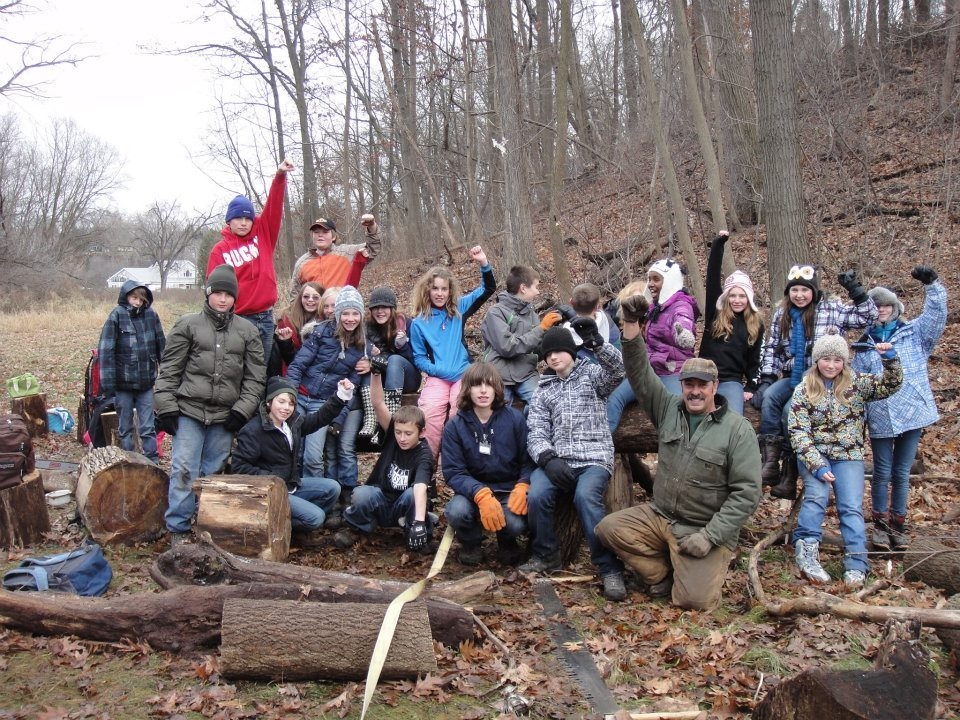
Students Restore a School Forest
Fox River Academy, Appleton, Wisconsin
Sometimes the best lessons are the hardest-fought ones. When the students of Fox River Academy, an environmentally focused charter school in Appleton, Wisconsin, identified a section of Pierce Park, adjacent to the school grounds, as an area they wanted to restore, they ran up against a severe physical challenge and some unexpected social challenges. The physical challenges lay in the site’s location and condition. Separated from the rest of Pierce Park by railroad tracks and dense stands of invasive plants, the site was full of trash and had suffered years of management neglect. Removing trash and invasive plants and creating some recreational infrastructure–trails, benches, signage–would be a long-term undertaking. The social challenges were even more daunting. The land had become a hangout for drug and alcohol users, who didn’t appreciate any attention and ultimately acted out to try to discourage the restoration work. But community service is an important element of the Fox River Academy curriculum, and the students, undaunted, were determined to contribute to the community in this way.
In the early stages of the project, the students spent most of their time scoping for information. With the help of field biologist, Jeff Nania, they came to understand the land’s true potential. The forest tract included an ephemeral wetland and was a vital part of the wildlife corridor used by migrant songbirds. Students felt the site could be a haven for people too, to walk and enjoy a piece of wild nature in an urban setting.
To learn more about park history, students dug into its recorded past. They contacted Bill Lecker, Executive Director of Parks and Recreation. Mr. Lecker was able to share interesting facts about the park including old letters, photographs, and blueprints. The study of these artifacts prompted a visit to the Register of Deeds Office where a copy of the deed for the property was obtained.
To get a more complete story of the park’s value to Appleton, students interviewed Appleton Mayor Tim Hanna, who grew up next to the park and spent much of his childhood playing in the ravine. From their visit with the mayor, students learned that a stream once ran through the area, verifying their field biologist’s hunch that the wetland portion of the forest had once helped buffer flooding. Through conversations with and surveys of neighbors, students have gained both the respect and support of the community. They held a public tour of the property and discussed their hopes for the park. Press coverage of the event helped grow public support and community participation.
Much of the work the students took on was hard physical labor. They spend one day each week clearing brush, cutting and removing invasive box elder trees, and cleaning up the site, including removing trash. Some of the box elder wood went to a local sawmill. Students used the milled lumber to build wood duck boxes and benches.
Lessons Learned
Natural restoration work is physically challenging: while the work requires that students develop their physical and mental stamina, there are equal benefits to physical and mental health. Students also had to learn to use new tools in a safe way.
Team building is key: Students have grown closer as a field team. They needed to learn how to work together. The project brought about stronger connections between students and to the land.
Never give up: There were many weeks when students arrived on site to find that vandals had tipped over stumps, knocked over the woodpile, smashed and scattered glass bottles, and generally made a mess. Once vandals left the message, GET OUT on the ground, using pieces of firewood. But Fox River Academy students were not intimidated. Community involvement is essential. They had the support of local police and the parks department. Neighbors were fully supportive. As one student put it, “Instead of giving up over small setbacks, everyone pitched in, picked up the mess, and got right back to work… someday, who knows, maybe some of the abusers will cross over and help take better care of it?”
Fox River Academy students were recognized for their conservation efforts with a top award from Disney’s Planet Challenge in 2012 and with the Earthguard Award from the Wisconsin Association for Environmental Education. They also won a service-learning grant of $56,700.00 from the State Farm Youth Advisory Board to continue restoration work.
Sandy Benton
Fox River Academy Co-founder
FIELD Edventures Co-founder
